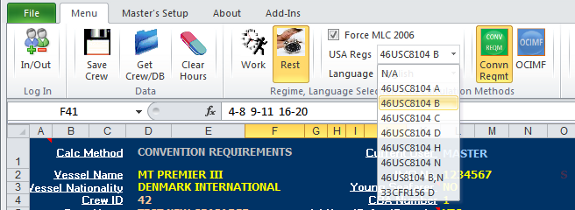The user can select the clauses applicable to his ship from the Ribbon drop down (Menu Dialog Box in Excel 2003) - With N/A selected, USA regulations are not applied

46 USC 8104
(a) An owner, charterer, managing operator, master, individual in charge, or other person having authority may permit an officer to take charge of the deck watch on a vessel when leaving or immediately after leaving port only if the officer has been off duty for at least 6 hours within the 12 hours immediately before the time of leaving.
(b) On an oceangoing or coastwise vessel of not more than 100 gross tons as measured under section 14502 of this title, or an alternate tonnage measured under section 14302 of this title as prescribed by the Secretary under section 14104 of this title (except a fishing, fish processing, or fish tender vessel), a licensed individual may not be required to work more than 9 of 24 hours when in port, including the date of arrival, or more than 12 of 24 hours at sea, except in an emergency when life or property are endangered.
Note: For sub-clause (b), the user has to select from either 'P' (In Port) or 'S' (At Sea) in column 'K'.

To reduce data entry to the minimum, column 'K' (for In Port / At Sea) is masked for all other clauses as the vessel's location is not relevant for computations.

(c) On a towing vessel (except a towing vessel operated only for fishing, fish processing, fish tender, or engaged in salvage operations) operating on the Great Lakes, harbors of the Great Lakes, and connecting or tributary waters between Gary, Indiana, Duluth, Minnesota, Niagara Falls, New York, and Ogdensburg, New York, a licensed individual or seaman in the deck or engine department may not be required to work more than 8 hours in one day or permitted to work more than 15 hours in any 24-hour period, or more than 36 hours in any 72-hour period, except in an emergency when life or property are endangered.
(d) On a merchant vessel of more than 100 gross tons as measured under section 14502 of this title, or an alternate tonnage measured under section 14302 of this title as prescribed by the Secretary under section 14104 of this title (except a vessel only operating on rivers, harbors, lakes (except the Great Lakes), bays, sounds, bayous, and canals, a fishing, fish tender, or whaling vessel, a fish processing vessel of not more than 5,000 gross tons as measured under section 14502 of this title, or an alternate tonnage measured under section 14302 of this title as prescribed by the Secretary under section 14104 of this title, yacht, or vessel engaged in salvage operations), the licensed individuals, sailors, coal passers, firemen, oilers, and water tenders shall be divided, when at sea, into at least 3 watches, and shall be kept on duty successively to perform ordinary work incident to the operation and management of the vessel. The requirement of this subsection applies to radio officers only when at least 3 radio officers are employed. A licensed individual or seaman in the deck or engine department may not be required to work more than 8 hours in one day.
(e) On a vessel designated by subsection (d) of this section—
(1) a seaman may not be—
(A) engaged to work alternately in the deck and engine departments; or
(B) required to work in the engine department if engaged for deck department duty or required to work in the deck department if engaged for engine department duty;
(2) a seaman may not be required to do unnecessary work on Sundays, New Year’s Day, July 4th, Labor Day, Thanksgiving Day, or Christmas Day, when the vessel is in a safe harbor, but this clause does not prevent dispatch of a vessel on a voyage; and
(3) when the vessel is in a safe harbor, 8 hours (including anchor watch) is a day’s work.
(f) Subsections (d) and (e) of this section do not limit the authority of the master or other officer or the obedience of the seamen when, in the judgment of the master or other officer, any part of the crew is needed for—
(1) maneuvering, shifting the berth of, mooring, or unmooring, the vessel;
(2) performing work necessary for the safety of the vessel, or the vessel’s passengers, crew, or cargo;
(3) saving life on board another vessel in jeopardy; or
(4) performing fire, lifeboat, or other drills in port or at sea.
(h) On a vessel to which section 8904 of this title applies, an individual licensed to operate a towing vessel may not work for more than 12 hours in a consecutive 24-hour period except in an emergency.
(n) On a tanker, a licensed individual or seaman may not be permitted to work more than 15 hours in any 24-hour period, or more than 36 hours in any 72-hour period, except in an emergency or a drill. In this subsection, “work” includes any administrative duties associated with the vessel whether performed on board the vessel or onshore.
(i) A person violating subsection (a) or (b) of this section is liable to the United States Government for a civil penalty of $10,000.
(j) The owner, charterer, or managing operator of a vessel on which a violation of subsection (c), (d), (e), or (h) of this section occurs is liable to the Government for a civil penalty of $10,000. The seaman is entitled to discharge from the vessel and receipt of wages earned.
33 CFR 156.210
(d) On vessels conducting lightering operations in a designated lightering zone, an officer or seaman may not work, except in an emergency or a drill, more than 15 hours in any 24-hour period, or more than 36 hours in any 72-hour period, including the 24-hour and 72-hour periods prior to commencing lightering operations.
The user may select from -
46USC8104 clauses are applied only for US documented vessels